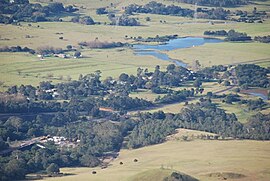Wongawilli, New South Wales
| Wongawilli Wollongong, New South Wales | |||||||||||||||
|---|---|---|---|---|---|---|---|---|---|---|---|---|---|---|---|
 | |||||||||||||||
| Coordinates | 34°28.5′S 150°45.5′E / 34.4750°S 150.7583°E | ||||||||||||||
| Population | 1,213 (2021 census)[1] | ||||||||||||||
| Postcode(s) | 2530 | ||||||||||||||
| Elevation | 24 m (79 ft) | ||||||||||||||
| LGA(s) | City of Wollongong | ||||||||||||||
| State electorate(s) | Shellharbour | ||||||||||||||
| Federal division(s) | Whitlam | ||||||||||||||
| |||||||||||||||
Wongawilli is a southern suburb of Wollongong, Australia at the foot hills of the Illawarra escarpment. The word "Wonga" is a native Aboriginal word meaning native pigeon.[2]
It contains a mixture of small rural properties and family homes. It has a New South Wales Rural Fire Service station and a small community hall where the Wongawilli colonial dance club meets regularly.[3] The community has had a long history with coal mining, with the Wongawilli colliery opening in 1916 by the Hoskins Brothers,[4] and later being taken over by BHP.[5] Since this time the mine has expanded and has had multiple owners, and is currently owned and operated by the Indian company Jindal Steel and Power.[6]
Notable residents
- Actor John Jarratt, born 1952
- Australian Rugby League player Robert Smithies, born 1948
References
- ^ Australian Bureau of Statistics (28 June 2022). "Wongawilli". 2021 Census QuickStats. Retrieved 31 July 2024.
- ^ Wongawilli History, Wollongong Library, 2011
- ^ Wongawilli Colonial Dance Club
- ^ Mining in New South Wales
- ^ Wongawilli Collery
- ^ "Jindal Steel Power || Home".

